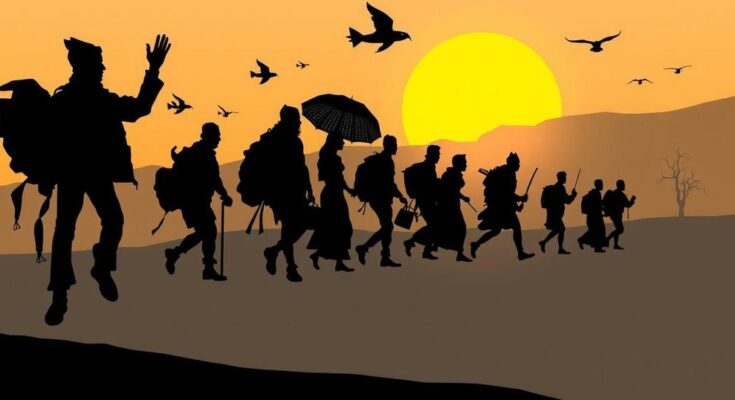The remains of 42 South African freedom fighters arrived in Pretoria on Wednesday after being exhumed in Zimbabwe and Zambia. This repatriation aims to provide closure to families and honor the contributions of these individuals in the anti-apartheid struggle. A homecoming ceremony led by President Cyril Ramaphosa will take place on Friday, with plans for further repatriations in the future.
On Wednesday, the remains of 42 South African freedom fighters, who passed away while in exile during the anti-apartheid struggle, arrived back in their homeland. The repatriation occurred at the Waterkloof Air Force Base in Pretoria, where government officials and family members were present to receive these individuals, who were exhumed from their graves in Zimbabwe and Zambia. This initiative is part of a government program aimed at providing closure to families who lost their loved ones during the conflict against the oppressive apartheid regime. Many of these activists had left South Africa to avoid imprisonment and to undergo military training, primarily in Zimbabwe and Zambia, where the African National Congress (ANC) and Pan Africanist Congress (PAC) had established strongholds. Notably, the ANC relocated its headquarters to Lusaka, Zambia, after being banned in South Africa. Among the distinguished individuals whose remains were returned are renowned freedom fighters Duma Nokwe, Florence Mophosho, and Basil February. During a Heritage Day event, South Africa’s Deputy President Paul Mashatile remarked that the repatriation is part of a broader effort to educate future generations about the contributions of these individuals to the anti-apartheid struggle. He expressed the initiative’s goals to “commemorate, celebrate, educate, promote, preserve, conserve, and provide a durable testament to South Africa’s road to freedom.” President Cyril Ramaphosa is scheduled to preside over a homecoming ceremony on Friday, where the remains will be formally handed over to their families for reburial across the nation. Furthermore, the government has announced plans to repatriate the remains of additional South Africans from countries such as Lesotho, Ethiopia, Tanzania, and Angola. Deputy Defense Minister Bantu Holomisa articulated hope that this process would expand to include more individuals who perished under difficult circumstances abroad, emphasizing the significance of reconnecting these individuals with their families. These efforts reflect a commitment to honor the sacrifices made during a pivotal chapter in South African history, ensuring that the legacy of those who fought against oppression continues to be recognized and remembered.
The arrival of the remains of South African freedom fighters in the country marks a significant moment in reconciling the traumatic history of apartheid. Many activists were forced into exile during the anti-apartheid era, which lasted from the mid-20th century until the early 1990s. The ANC and PAC led the struggle against the apartheid regime, fighting for democracy and equality in South Africa. Following the end of apartheid in 1994, the South African government has undertaken initiatives to repatriate the remains of those who perished while fighting for liberation, as part of national healing and remembrance. This particular event serves as a poignant reminder of the sacrifices made by many during the struggle and aims to strengthen the nation’s collective memory and identity.
In summary, the repatriation of the remains of 42 South African freedom fighters symbolizes a crucial step toward reconciling the nation’s past and honoring its heroes. The initiative aims to promote awareness among future generations and facilitate healing for families affected by the legacy of apartheid. As efforts continue to repatriate more remains from exile, this endeavor underscores the importance of remembering those who made significant sacrifices in the fight for freedom in South Africa.
Original Source: www.usnews.com




